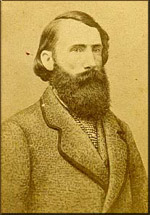
|
|
General Ambrose Powell Hill [Image from the Webmaster's collection] |
On their deathbeds (at least according to popular and widely accepted mid-19th century accounts), both Stonewall Jackson and Robert E. Lee called out for A.P. Hill, imploring him to "come up." Who was the man who had made such an impression on the leading lights of the Army of Northern Virginia?
Ambrose Powell Hill was born in Culpeper, Virginia, on November 9, 1825. He graduated from West Point in 1847, fifteenth in a class of 38. Originally a member of the illustrious class of 1846 (which counted among its number George B. McClellan, George Edward Pickett, Dabney Herndon Maury, and Thomas J. "Stonewall" Jackson), Hill's graduation was delayed a year while he recovered from a serious bout of what is now generally believed to have been venereal disease, a condition that would impair his health until the end of his life.
Upon his graduation, Hill was given an officer's commission in the artillery and served in both the Mexican and Seminole Wars and on the frontier until tendering his resignation from the U.S. Army on March 1, 1861. When the War began, he was given command of the 13th Virginia Infantry but rose quickly to the rank of brigadier general in the Confederate States Army (February 1862). He was further promoted to major general in May of the same year.
Hill's division, a part of Robert E. Lee's Army of Northern Virginia, was known for its ability to move quickly and proudly bore the name "Hill's Light Division." Perhaps its most heroic moment came during the Battle of Sharpsburg on September 17, 1862, when Hill marched his men 17 miles from nearby Harpers Ferry, arriving on the field just in time to crush Union forces under Ambrose Burnside and save the Confederate right from almost certain destruction.
Shortly after the stunning Southern victory at Chancellorsville in May of 1863 (during which Hill assumed command of Stonewall Jackson's forces after his wounding until he himself was felled by an enemy bullet), Hill was named lieutenant general and given command of the newly created Third Corps. The Third Corps saw action at Gettysburg and during The Wilderness campaign, although it did not distinguish itself in either. Illness kept Hill away from his command in May of 1864 and again in March of 1865, but the Third Corps participated in the North Anna, Cold Harbor, and Petersburg campaigns. On April 2, 1865, just one week before General Lee surrendered to superior Union arms at Appomattox Court House, Hill was shot and killed during the final defense of Petersburg.
[Webmaster's note: Hill left behind a wife, Kitty Morgan Hill (the sister of Kentucky cavalry raider John Hunt Morgan), whom he married after his engagement to Ellen Marcy was torpedoed by her parents. Miss Marcy eventually married future Union general and 1864 Democratic presidential candidate George McClellan, prompting one of Hill's men to wish, at the height of a fierce clash with McClellan's forces during the Peninsula campaign, that "Nelly" had said "yes" to Hill and thereby spared the Army of Northern Virginia the necessity of exacting Hill's revenge on his romantic rival.]

"Tell A.P. Hill"